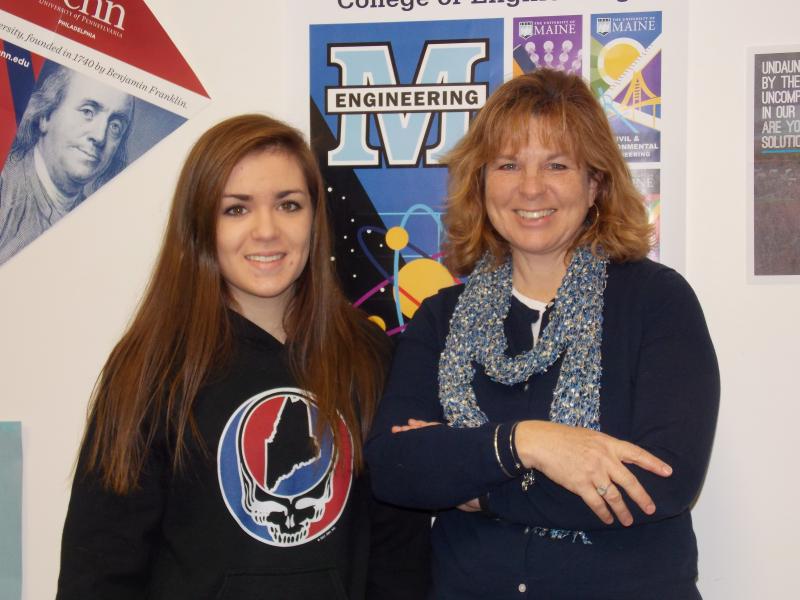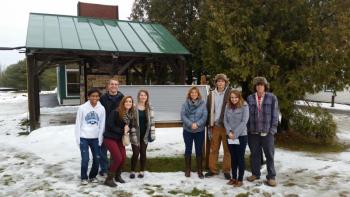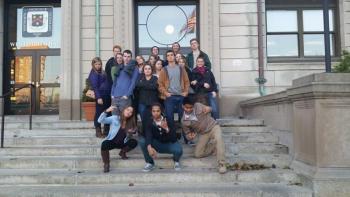It's dangerous to go alone
Remember back to your days in high school, wading through the paperwork and confusion of applying to college. Or more recently, maybe you've helped a family member through that process.
There are dozens of forms to fill out, all while juggling the confusion of financial aid, visiting campuses, and more. It can be a daunting task for any family and student to face.
At Boothbay Region High School, students and parents don't face this alone. They can turn to Kerrin Erhard, the College Access Counselor, for help and guidance.
“My job is to make college more accessible for every student,” Erhard said. “It's especially important for students who don't know what they want to do to be exposed to what is offered to help them find their way.”
Erhard started at BRHS as an ESL (English as a second language) teacher, and last year was her first year as the College Access Counselor.
The position came into being after Guidance Counselor Jen Burns applied for and got the Maine College Access Challenge Grant in 2012. The purpose of this grant is to make college more accessible to students.
“Our college enrollment for the senior class was at less than 50 percent,” Burns said. “We definitely qualified for the grant.”
According to Burns, the first year they had the grant, they used it to upgrade their computer lab and bring online tools to students, such as FAFSA filing labs. She then learned that many schools who had gotten this grant used it to hire someone specifically to help students, which seemed like a great idea to her.
Erhard's job involves helping students with paperwork, financial aid and online tools. She will even sit down and fill out FAFSAs with students, and help when a student's family isn't interested in the idea of college, and can't, or won't, help financially.
She helps the student apply for “dependency override” and calls schools to appeal directly (normally, a student is considered dependent and parents' income counts regarding financial aid until the age of 26).
A fun part of Erhard's job is when she gets the students onto the campuses they are interested in attending.
“Sometimes students get a gut feeling that 'this place is for me' or 'this school isn't right' when they actually set foot on a campus,” Erhard said. “We always try and eat lunch at the schools we visit, because there is something about being there that brings down the barriers.”
This year, Erhard has already taken students to many different schools, including a trip to Unity College where one of the students who had applied, senior Kyle Alamo, was accepted during their visit.
“They congratulated him and gave him a Unity shirt and took pictures; it was great,” Erhard said.
Erhard also helps students take the College Board Accuplacer, which is a requirement at most community colleges unless a student's SAT scores are especially high. Erhard helps the student prepare, and gives them a chance to take the test in an environment they are used to. Students who have already graduated are also getting help from Erhard, by getting help with placement tests.
“Often the student does know the material,” Erhard said. “But if they took Algebra II two years ago, the material might not be fresh in the mind.”
Erhard takes students to colleges they are interested in that are within a three-hour drive, so it is a day trip.
She also arranges a trip to Boston every year, where students visit two or three schools in one day. Two big trips coming up are to the University of Maine at Orono and The Landing School, a marine school located on the Kennebec River that teaches boatbuilding and yacht design.
“For some kids, traditional college is not right for them,” Erhard said. “Technical schools are great choices for them. We explore all sorts of options, we do career days, military interviews, tour Chewonki and the Department of Marine Resources.”
Erhard is also working with Burns to bring college awareness to younger students. She brings eighth grade students over from BRES for three days for college awareness days. Next year she plans to involve the seventh graders, and even give the sixth graders an awareness day when juniors and seniors from the high school come over and talk to the students about their paths.
“So far, the grant is working very well,” Burns said.
The first year the college enrollment of BRHS student skyrocketed from less than 50 percent to a whopping 96 percent. Last year it reached 87 percent, and this year as of February first it had already reached 75 percent.
“We expect that number to reach far about 80 percent by May,” Burns said.
Above all, Erhard and Burns stress to students that it's not where they go that matters, but what they put into it. Maybe they don't get accepted to their “dream” school, but it's OK, because there are over 2,000 four-year colleges in the United States, and many other two-year ones, and at least one will take them where they want to go in life.
Erhard, herself, had an interesting path to this job. She got her veterinary tech degree, then 10 years later went back to school to get a bachelor’s in recreation therapy before finding herself at Boothbay Region High School.
“Putting yourself in learning situations is always beneficial,” Erhard said. “My number one goal is to help a student find where they fit best, where they want their path to take them.”































